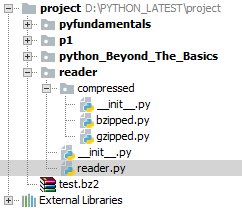For this particular case, the double import warning is due to this line in proj/__init__.py:
from .proj import main
What that line means is that by the time the -m switch implementation finishes the import proj step, proj.proj has already been imported as a side effect of importing the parent package.
Avoiding the warning
To avoid the warning, you need to find a way to ensure that importing the parent package doesn't implicitly import the package being executed with the -m switch.
The two main options for resolving that are:
- Drop the
from .proj import main line (as @John Moutafis suggested), assuming that can be done without breaking API compatibility guarantees; or
Delete the if __name__ == "__main__": block from the proj submodule and replace it with a separate proj/__main__.py file that just does:
from .proj import main
main()
If you go with option 2, then the command line invocation would also change to just be python -m proj, rather than referencing a submodule.
A more backwards compatible variant of option 2 is to add __main__.py without deleting the CLI block from the current submodule, and that can be an especially good approach when combined with DeprecationWarning:
if __name__ == "__main__":
import warnings
warnings.warn("use 'python -m proj', not 'python -m proj.proj'", DeprecationWarning)
main()
If proj/__main__.py is already being used for some other purpose, then you can also do things like replacing python -m proj.proj with python -m proj.proj_cli, where proj/proj_cli.py looks like:
if __name__ != "__main__":
raise RuntimeError("Only for use with the -m switch, not as a Python API")
from .proj import main
main()
Why does the warning exist?
This warning gets emitted when the -m switch implementation is about to go and run an already imported module's code again in the __main__ module, which means you will have two distinct copies of everything it defines - classes, functions, containers, etc.
Depending on the specifics of the application, this may work fine (which is why it's a warning rather than an error), or it may lead to bizarre behaviour like module level state modifications not being shared as expected, or even exceptions not being caught because the exception handler was trying to catch the exception type from one instance of the module, while the exception raised used the type from the other instance.
Hence the vague this may cause unpredictable behaviour warning - if things do go wrong as a result of running the module's top level code twice, the symptoms may be pretty much anything.
How can you debug more complex cases?
While in this particular example, the side-effect import is directly in proj/__init__.py, there's a far more subtle and hard to debug variant where the parent package instead does:
import some_other_module
and then it is some_other_module (or a module that it imports) that does:
import proj.proj # or "from proj import proj"
Assuming the misbehaviour is reproducible, the main way to debug these kinds of problems is to run python in verbose mode and check the import sequence:
$ python -v -c "print('Hello')" 2>&1 | grep '^import'
import zipimport # builtin
import site # precompiled from /usr/lib64/python2.7/site.pyc
import os # precompiled from /usr/lib64/python2.7/os.pyc
import errno # builtin
import posix # builtin
import posixpath # precompiled from /usr/lib64/python2.7/posixpath.pyc
import stat # precompiled from /usr/lib64/python2.7/stat.pyc
import genericpath # precompiled from /usr/lib64/python2.7/genericpath.pyc
import warnings # precompiled from /usr/lib64/python2.7/warnings.pyc
import linecache # precompiled from /usr/lib64/python2.7/linecache.pyc
import types # precompiled from /usr/lib64/python2.7/types.pyc
import UserDict # precompiled from /usr/lib64/python2.7/UserDict.pyc
import _abcoll # precompiled from /usr/lib64/python2.7/_abcoll.pyc
import abc # precompiled from /usr/lib64/python2.7/abc.pyc
import _weakrefset # precompiled from /usr/lib64/python2.7/_weakrefset.pyc
import _weakref # builtin
import copy_reg # precompiled from /usr/lib64/python2.7/copy_reg.pyc
import traceback # precompiled from /usr/lib64/python2.7/traceback.pyc
import sysconfig # precompiled from /usr/lib64/python2.7/sysconfig.pyc
import re # precompiled from /usr/lib64/python2.7/re.pyc
import sre_compile # precompiled from /usr/lib64/python2.7/sre_compile.pyc
import _sre # builtin
import sre_parse # precompiled from /usr/lib64/python2.7/sre_parse.pyc
import sre_constants # precompiled from /usr/lib64/python2.7/sre_constants.pyc
import _locale # dynamically loaded from /usr/lib64/python2.7/lib-dynload/_localemodule.so
import _sysconfigdata # precompiled from /usr/lib64/python2.7/_sysconfigdata.pyc
import abrt_exception_handler # precompiled from /usr/lib64/python2.7/site-packages/abrt_exception_handler.pyc
import encodings # directory /usr/lib64/python2.7/encodings
import encodings # precompiled from /usr/lib64/python2.7/encodings/__init__.pyc
import codecs # precompiled from /usr/lib64/python2.7/codecs.pyc
import _codecs # builtin
import encodings.aliases # precompiled from /usr/lib64/python2.7/encodings/aliases.pyc
import encodings.utf_8 # precompiled from /usr/lib64/python2.7/encodings/utf_8.pyc
This particular example just shows the base set of imports that Python 2.7 on Fedora does at startup. When debugging a double-import RuntimeWarning like the one in this question, you'd be searching for the "import proj" and then "import proj.proj" lines in the verbose output, and then looking closely at the imports immediately preceding the "import proj.proj" line.


python -m WHATEVER.FILE) when that file is also automatically being imported within the package (any__init__.py, which is loaded, containsfrom WHATEVER import FILE). Right? – Bowknot